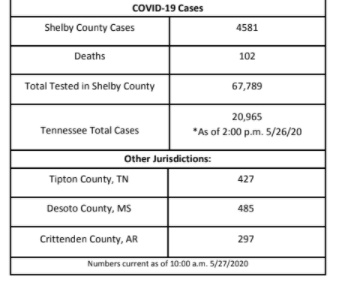
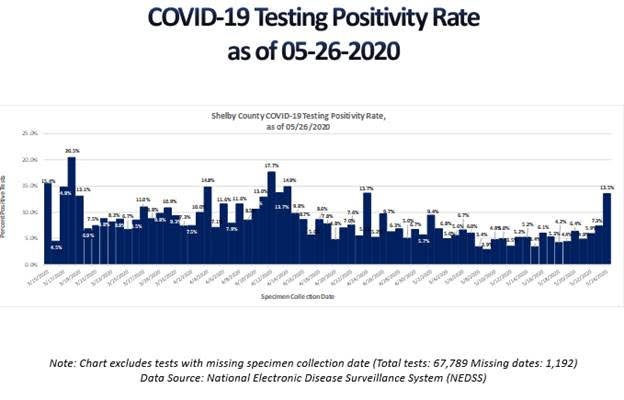
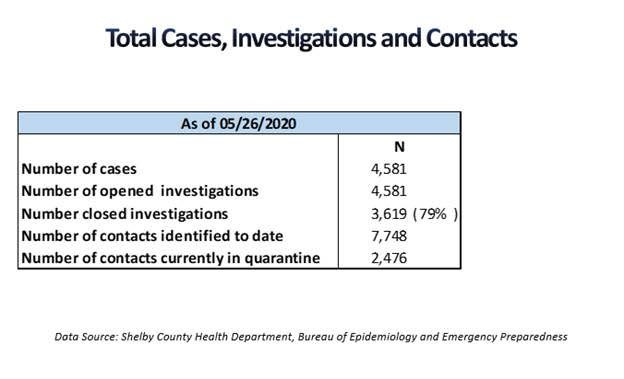
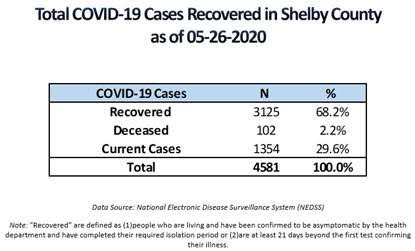
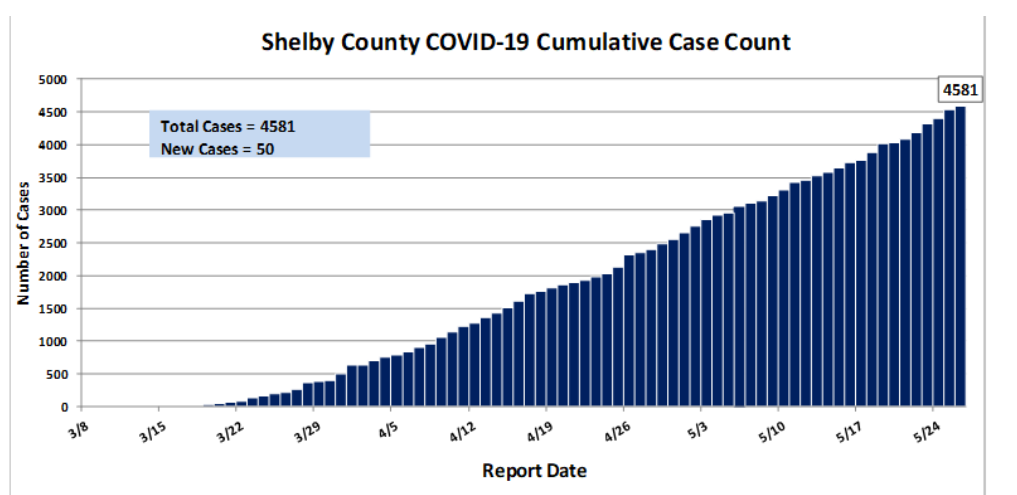
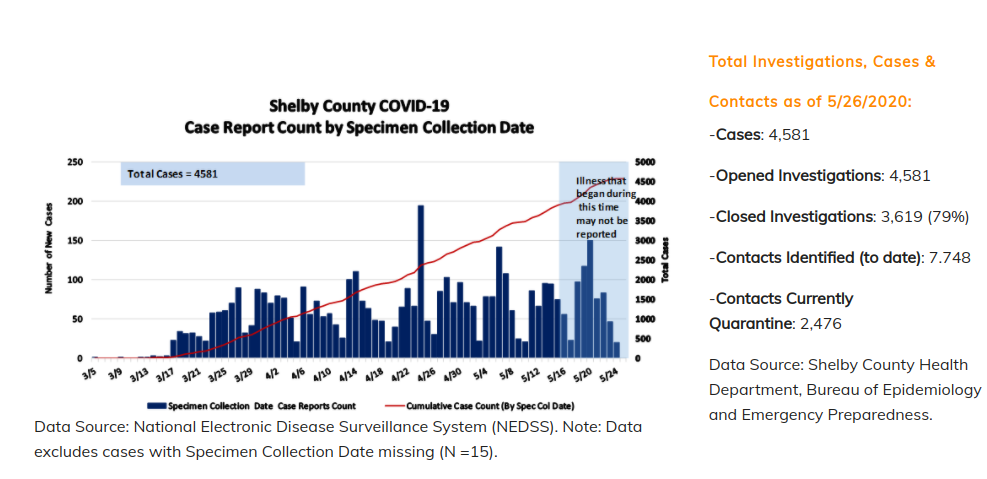






The little girl stands shyly in front of her beaming parents. She is holding a sign that reads, “Take Off Your Mask Because God’s Got You Covered!” The picture was all over social media last weekend, as were videos of protesters hanging the governor of Kentucky in effigy, a television reporter getting hassled and manhandled in Minnesota as he covered a protest by those wanting a local bar to be opened, and a massive, bumping pool party at the Lake of the Ozarks, apparently featuring a guest appearance by hip-hop artists Sodom and Gomorrah.
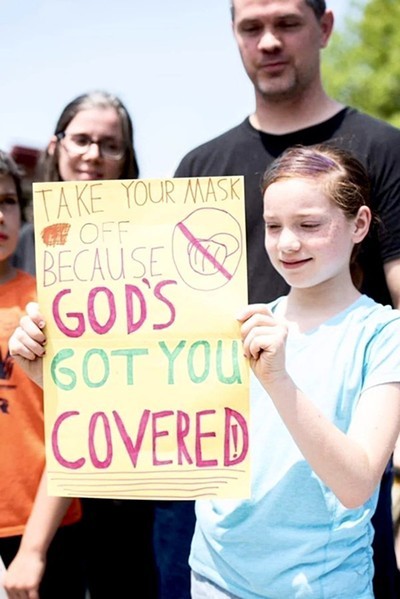
It was all just more media fodder, more bullets being fired in the viral culture war over COVID-19 between the two major American tribes: the Whoa-Nows and the Phugits.
The Whoa-Nows, as we know, are a cautious people. They favor the wearing of masks and social distancing. They generally avoid large gatherings and believe in taking a slow, measured approach to reopening the American economy, based on medical data, scientific research, and the experiences of other countries around the globe. Do not attempt to get closer than six feet to a Whoa-Now.
Their ancestral rivals, the Phugits, say the crisis is overblown, the death rate is miniscule and only affects the weak, and it’s time to stop living in fear. The Phugits are over it. They believe the COVID scare is a hoax designed to destroy America and that masks are for wussies (read, Whoa-Nows). They say open the bars, open the malls. Time to party! God’s got us covered, y’all!
Last weekend, as the Whoa-Nows mostly hunkered in their home encampments, venturing out in masks only to buy food (and maybe booze), members of the Phugit tribe took the occasion of Memorial Day to celebrate the country’s glorious victory over COVID, gathering in massive tribal groups at lakes, beaches, bars, and clubs. There was drinking and dancing — and hooting and hugging and humping. Victory was sweet!
The nominal leader of the Phugits, Chief Tweetzalot, took the occasion to play golf, accuse TV host Joe Scarborough of murder, make fun of Joe Biden for wearing a mask, and bully the governor of North Carolina. And it was good. Huzzah!
Considering the 14-day incubation period for COVID-19, we should have a pretty definitive idea of which tribe’s version of reality is closer to the truth in a couple of weeks. Will it just go away, as the Phugits are saying? Are we really out of the woods? Or are we going to have to shut things down again and start all over because of a new surge of infections? We’ll see. Until then, I’m avoiding members of the Phugit tribe like, well, the plague.
Which means, like most of my Whoa-Now brothers and sisters, I’ve been spending a lot of quiet time doing quiet things. For starters, our garden is weedless. Really weedless. And I’ve got guitar calluses on my fingertips again for the first time in years. The old Gibson even got new strings last week. My finger-picking has picked up nicely. In other art news, I’m creating a lovely collection of red wax sculptures from Babybel cheese packaging.
All my clothes are really clean. And quite dry. And folded. My yard is mowed — and edged. I’ve never edged my yard before. Very satisfying. Last weekend, we power-washed the driveway. Also very satisfying. Looking forward to taking on the front walk soon. It’s good to have dreams.
In the evenings, my wife and I are exploring the deep end of the streaming pool, including watching six 10-episode seasons of Bosch in about two weeks. And The Great is really great. Huzzah! Also, we’re discovering, lots of programs are not great. At all. Sometimes we watch them all the way through, just to make sure.
I’ve also been spending way too much time coming up with answers to this game: Ruin a Band’s Name by Changing One Letter. My best ones so far include Alice in Chairs, The Belch Boys, Guns R’ Roses, Prance, Stye, Iggy Poo, and Green Dad. Your mileage may vary.
And I keep returning to that photo of the little girl whose parents have convinced her that God will protect her no matter what, even if she ignores medical advice. Do they let her wear a seatbelt? And why does her mother wear glasses, since it was God who apparently gave her crappy eyesight? So many questions. So much chaos. So much anger and confusion in this country. When will it end? Is there an end?
It’s enough to make you want to join the Phugits and hit the Lake of the Ozarks.
Bruce VanWyngarden
brucev@memphisflyer.com
The beard is coming in a slightly different shade than I remember. I may have started out to look like Papa Hemingway, but after the last two months I’ve been starting to feel more like Col. Kurtz. The city may be opening up a little, but that stint in our collective closet under the stairs has left its mark on us. It didn’t strike me how much we’ve changed over the course of the quarantine until I was leaving the grocery store the other day. A young lady, probably a college student, was about to drop her sack while wrestling with the car door. She called for her friend who was climbing in the passenger seat but, alas, she was soul-deep into some virtual drama on her phone and didn’t hear.
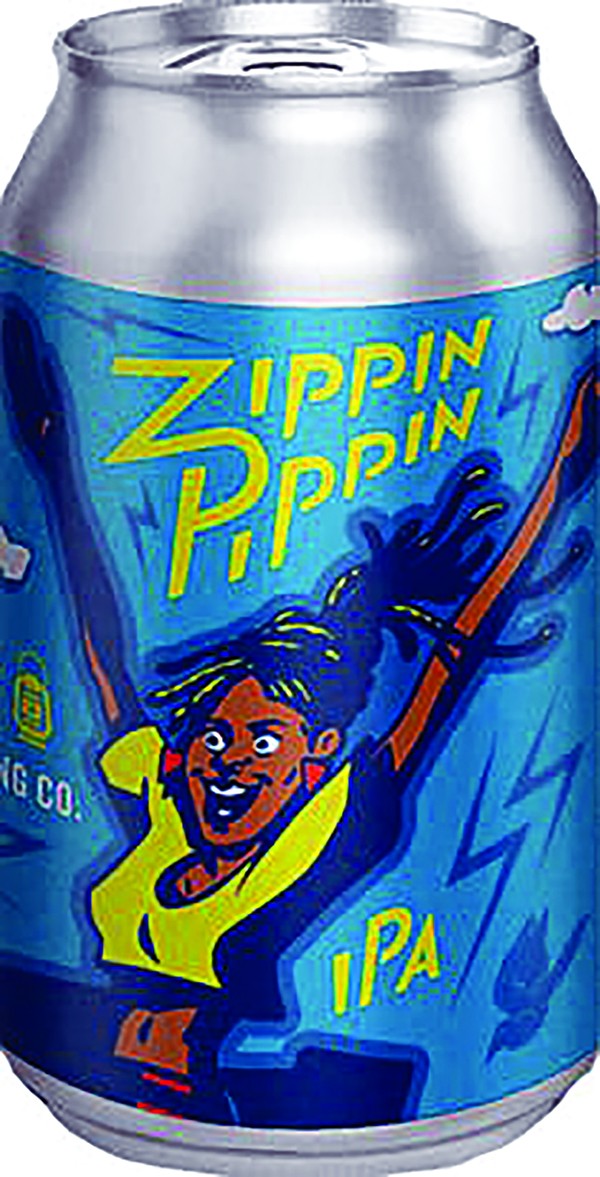
I went full Galahad and popped over, opening the door for her while simultaneously steadying her bag without letting go of mine. She thanked me sheepishly, and I went on my way. Which was when I caught sight of myself in the reflection of the back window: sunglasses, wild, uncut hair curling out from under a baseball cap, and I hadn’t yet pulled the red bandana down from over the rest of my face. Back in the olden days (read: March), suddenly appearing behind a lady looking like that with a bandit mask would have earned me eardrums pierced by a girly shriek and eyes full of mace in the bargain. I’d have deserved it, too. The new normal isn’t exactly normal.
What I had in my bag was a six-pack of Ghost River Brewing Co.’s Zippin Pippin IPA. I was going to pick out a far more exotic brew to review, but this was something of a comfort response; my first craft beer love was IPA. More than that, the name Zippin Pippin takes me back to a time when I had little to no concept of personal space and went around breathing on people with impunity. Perhaps these are rose-tinted memories. Even back then, I remember standing in line for my favorite roller coaster and socially distancing myself from the kid who’d shown up wearing nothing but his Spider-Man Underoos and a pair of knock-off Converse sneakers.
I got home and told Mrs. M about the encounter, and she helpfully pointed out that the baseball hat in question was from Sewanee, which is just shy of ominous. “But it’s really faded,” said I with a hint of sinister darkness.
“Because you wear it sailing!” she said. “Where’s the menace in that?”Now how would she have known that?
No one here is interested in exactly how I lost that particular point to Mrs. M.
At any rate, Zippin Pippin is a good year-round beer — a little more amber-copper in color than what you might expect, but a fine, solid IPA. There is something almost piney in the scent, with a good citrus zing to it. It is hoppy, but without something to prove. Having said that, what bitterness it has tends to linger on the palate. Something lovely for the hop-heads, but come Fourth of July, should you find yourself standing around in the 98-degree heat for five hours, it might make you want to shave your tongue. With an ABV of 6.9 percent, after a few hours, you might do it.
Like its namesake, Zippin Pippin is a classic — the comfort of the familiar with enough of a wallop to get us through this weird “are we or aren’t we” phase of the quarantine. And we’re going to need it, because re-entry is going to be tough. I mean that for all of us, not just those of us currently stress-testing the structural integrity of our pants.
As a birthday present, a friend of mine was given a highball glass with the company logo on it by his boss — you know, for a Zoom meeting cocktail.
Nick Black and his wife, Lena, are cutting up in the kitchen.
While Nick sings, his wife chops onions and other vegetables as she prepares vegetarian dishes. In between, they joke back and forth.
When they’re not doing this in real life, the couple does it weekly on Cooking & Crooning, which airs at 6:30 p.m. Wednesdays on Facebook Live.
“I love cooking,” Lena says. “I think I’m probably a good cook. Nick says I’m a great cook. I come by cooking naturally. My mom is the biggest feeder in the world. She taught me to cook and to have a stocked pantry.
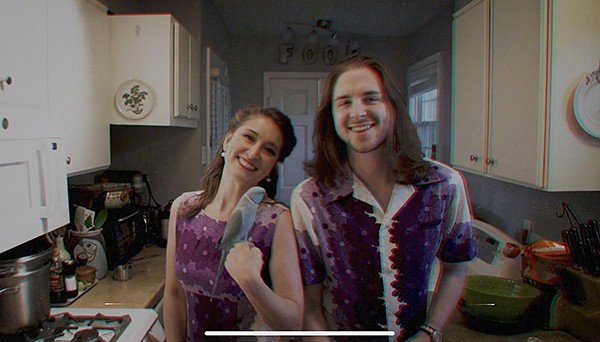
“I have a lot of grains, a lot of ‘cheater’ things — boxed things, flavored rices, pastas, canned beans. Some things are better canned. Canned corn. Canned tomatoes. Some recipes you can’t do without canned tomatoes.”
Lena came up with the idea for the cooking/singing show when the quarantine began. Nick, a pop/soul artist who recently released his new single “IRL,” was “making it a priority to figure out different live streams and reach people. I said, ‘Hey, maybe I can help him.'”
She told him, “We can do a live stream together. You sing. I cook. We call it Cooking & Crooning. I can make interesting meals just with what we’ve got on hand, which is great for quarantine. Nick can sing songs off the top of his head.”
What goes on in Cooking & Crooning, now in its 10th week, isn’t much different from what goes on at home. “That’s life with us,” Lena says. “When I’m in the kitchen, he’s making up songs about me chopping potatoes.”
Nick demonstrates by coming up with a song on the spot: “You got a friend in me. You got a friend in me. When the road gets rough and you’re miles and miles from your nice warm bed, she’s cooking onions. And that’s what I said.”
“I thought it would be fun every now and then if people could get a little slice of what it’s like to live with him,” Lena says. “He makes a little song that pretty much narrates things around the house. That’s a daily phase. It can be about the most banal thing. It can be about dusting.”
Viewers sometimes suggest dishes, but everything must be vegetarian. “I’m a staunch vegetarian. And Nick is basically an at-home vegetarian. We don’t buy meat anymore. But he won’t refuse it if he goes somewhere.”
Lena made Buddha Bowls on one show. “Typically, it’s a bowl of some kind of grain,” she says. “Lots of fresh vegetables and some cooked vegetables with some sort of bean or sauce and nuts or seeds.” She made “crabless crab cakes” on another show. “It’s made from palm hearts instead of crabmeat. And it’s delicious.”
“We had a pretty epic Cinco de Mayo episode where she made vegetarian tacos with homemade tortilla chips,” Nick says. People comment, cook along with them, and ask for song requests from Nick, who plays his originals as well as cover songs and impromptu material.
They also raise money for Edible Memphis, No Kid Hungry, and other groups.
Nick recently began live streaming Nick Black’s 30 Day Twitch Sample Challenge (twitch.tv/nickblackmusic), where he asks viewers to give him a riff, which he then uses in an original song.
Lena is Theatre Memphis’ director of education and outreach. “While she’s working, sending emails, and sending content for Theatre Memphis, I’m kind of just always around the house singing to myself,” Nick says. “I thought it was a good idea to hole myself up and channel that energy. It’s definitely helped with my musical ADD.”
Cooking & Crooning usually lasts an hour and a half. “She may have a few more minutes on the dish, and I’ll do my last song and we’ll say goodnight, play the theme one more time, and put up the photo of the meal on Instagram — @lenawallaceblack — and Facebook,” Nick says.
Then what do they do? “We sit down and watch Netflix and eat,” Lena says. “Leave the kitchen a complete disaster and come back and clean later.”
To watch the next show, find them at facebook.com/nickblackmusic.
One of the most quietly influential films of the last 30 years is Man Bites Dog. The 1992 film was created by three Belgians: Rémy Belvaux, André Bonzel, and actor Benoît Poelvoorde. The trio took the mockumentary sub-genre — which takes the tropes used by news broadcasts and documentary filmmakers and twists them to comedic ends — in a strange and disturbing new direction. Poelvoorde played a serial killer named Ben, who invites a film crew along to document his “art.” Belvaux and Bonzel play the director and cameraman who, at first, believe they are participating in a radical new form of cinema. But as Ben’s body count mounts — and includes their sound man — the filmmakers find themselves drawn deeper and deeper into Ben’s crimes.
Man Bites Dog is wickedly funny, but it was little seen in America thanks to an inexplicable NC-17 rating. But its spirit was definitely present in The Office, Ricky Gervais and Stephen Merchant’s millennial BBC TV series which inspired the American mega-hit starring Steve Carell. Now, a deadpan protagonist talking to the camera about his bad behavior has become a familiar trope in TV and movies.
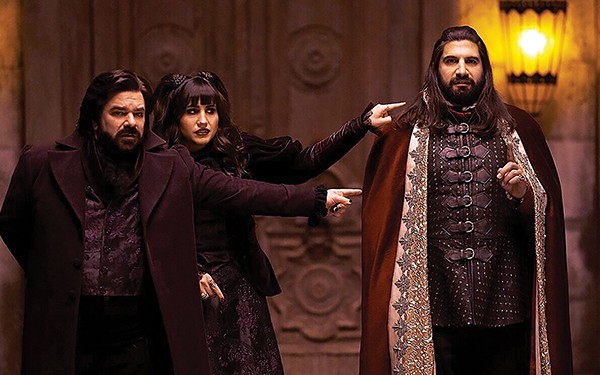
Dark shadows: Berry, Demetriou, and Novak suck at being roommates
Flight of the Concords‘ Jemaine Clement and New Zealand super-director Taika Waititi’s 2014 film What We Do in the Shadows owed a huge debt to Man Bites Dog, only instead of the mundane life of a serial killer, it “documented” a group of vampires living together as flatmates in a sleepy Wellington suburb. The film took the same slapstick attitude toward murder that made Man Bites Dog so shocking, but sanded off its arch edges by making the vamps, played by Clement and Waititi, kinda goofy in that charming New Zealand-y way.
The movie was funny, but not huge, box-office wise. But it did make the perfect setup for a post-Office sitcom. With Waititi off making projects like Thor: Ragnarok, Jojo Rabbit, and a new Star Wars project, Clement took the Shadows concept to TV in 2019, moving the setting to Staten Island and introducing a new cast of bloodsuckers.
Nandor the Relentless (Kayvan Novak) is a 700-year-old vampire who was once the bloodthirsty king of a minor empire, kinda like Vlad the Impaler. Nadja (Natasia Demetriou) was once a Roma fortune teller who vampirized Laszlo Cravensworth (Matt Berry), a pompous English nobleman, then married him. Those three characters are all familiar vampire types right out of Bram Stoker and Anne Rice. But the show’s secret weapon is Mark Proksch. His Colin Robinson, who wouldn’t be out of place in The Office, is an “energy vampire.” Instead of blood, he drains his victims of the will to live by telling long, boring stories. Since all self-respecting vampire stories require a Renfield, Nandor has Guillermo (Harvey Guillén) in his thrall as a familiar.
The core cast hit the ground running in season one as an already tight unit with easily relatable roomie relationships. They’re friends who chafe against the strictures of communal living. None of the centuries-old friends have really adapted well to the modern world, particularly the difficulty of acquiring virgins, who are particularly tasty treats for vampires. They mostly offload that responsibility on the put-upon Guillermo, who desperately wants to become a vampire himself.
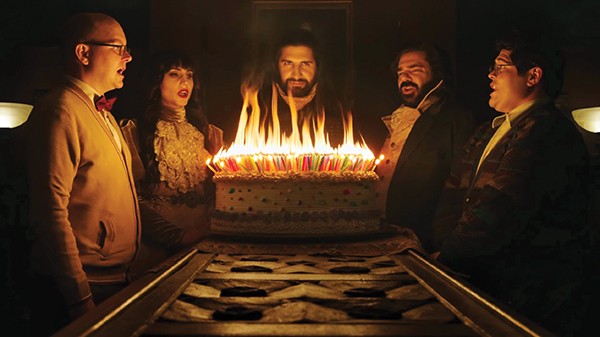
Mark Proksch, Natasia Demetriou, Kayvan Novak, Matt Berry, and Harvey Guillén
The highlight of season one was the climax, where the roomies are brought before a council of vampires to be judged for their crimes to vampiric kind. Not only did Clement and Waititi reprise their roles for the show, but they worked their showbiz connections to assemble an all-star cast of people who have played vampires in the past, from Tilda Swinton (Only Lovers Left Alive) to Wesley Snipes (Blade).
The second season, currently airing on FX, has been perfect from the get-go. Guillermo is dealing with the revelation that he is a descendant of Dracula’s nemesis Van Helsing. His identity crisis comes to a head when he stumbles into a group of would-be vampire slayers, bringing Buffy into the parody mix. The vamps branch out into the neighborhood by attending what they believe to be an owl-themed party that turns out to be a Super Bowl gathering of dreary suburbanites.
Colin gets the best episode of the season so far when he is promoted to boss at his office job and proceeds to become extraordinarily powerful by sucking the energy out of his hapless underlings. The big-time cameos continue with an absolutely killer turn by Mark Hamill as Vampire Jim, an enemy from Laszlo’s past who forces our hero vamp to assume an alternate identity as Jackie Daytona, a bartender obsessed with women’s volleyball.
The combination of gothic, slapstick, and deadpan makes for fertile comedy ground, and Clement and company show no sign of exhausting it any time soon. The scripts are sharp, the visual effects are used sparingly but effectively, and the cast is one of the best on television. The quirky, modest What We Do in the Shadows has become destination TV.
What We Do in the Shadows airs on Wednesdays on FX.
This Thursday, enjoy the flavors of Asian cuisine from the comfort of your own home during a virtual cocktail dinner presented by Salt|Soy and special partners Alchemy, Tattersall Distillery, West TN Crown, and Joe’s Wine & Liquor.
Salt|Soy is a sushi pop-up that was founded in 2016 by Alchemy owner Nick Scott, out of his love and passion for crafting Asian cuisine, which he discovered during years of experience as a sushi chef for Do Sushi and Bluefin.
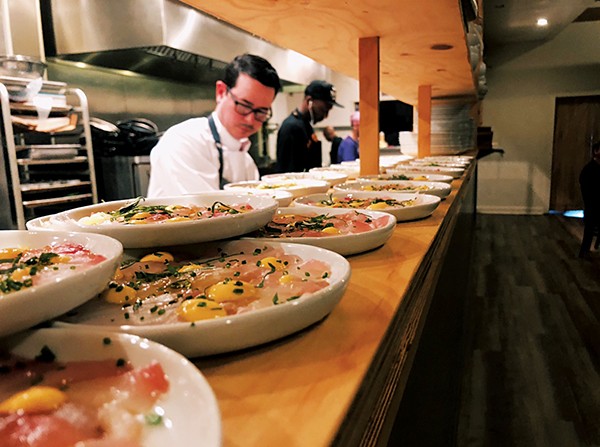 Nick Scott
Nick Scott
Nick Scott’s Salt|Soy brings you virtual sushi.
“It’s been something that I’ve always loved to do, and if I had a specialty, that would be it,” he says.
In the past, Scott has hosted regular sushi pop-ups and collaborative cocktail dinner events at Alchemy and at Puck Food Hall, but when COVID-19 put a wrench in his plans for future events, he quickly got to work planning virtual experiences to showcase his and others’ culinary talents.
As hosts walk viewers through what went into the Korean- and Japanese-inspired menu, attendees can expect to savor the flavor of saké-infused cocktails crafted by Alchemy with menu items such as sunomono (Japanese cucumber salad) and kimbap (Korean sushi) with a unique twist.
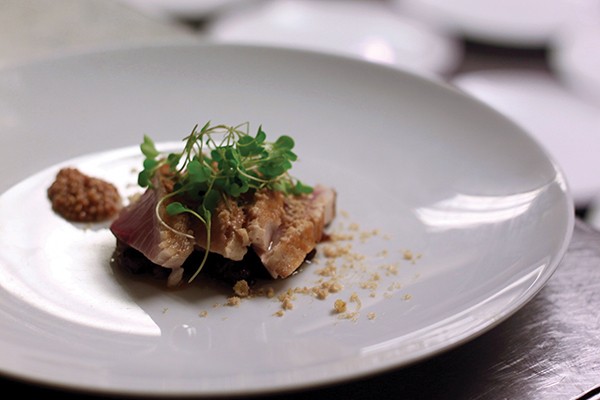 Nick Scott
Nick Scott
“We’re going to be incorporating bulgogi into the kimbap,” he says.
Scott says he is thrilled to be able to continue bringing people together, albeit virtually, to enjoy dinner and drinks while supporting small or local businesses.
“We’re experiencing a culture shift, and no one knows what that’s going to end up looking like,” says Scott. “So we wanted to bring people together without bringing people together and provide an experience like you would sitting at a long table with everybody. And this gives people a chance to learn something new about unique ingredients or local products.”
Salt|Soy Virtual Cocktail Dinner Featuring Cocktails By Alchemy, Thursday, May 28th, pick up at Alchemy at 6 p.m., dinner at 6:45 p.m., $70.
With shelter-in-place still the most responsible policy for all of us, a lot of people are imagining that the once-thriving music scene in Memphis is withering on the vine. But a lot of people would be wrong.
Casting a wide net for signs of life recently, I’ve reeled in a full haul of ways that local musicians are rising to the challenge of making their art accessible, and, in some cases, even making a little money. Though their income sources have shrunk, musicians are honoring their best impulses to simply get their art out there.
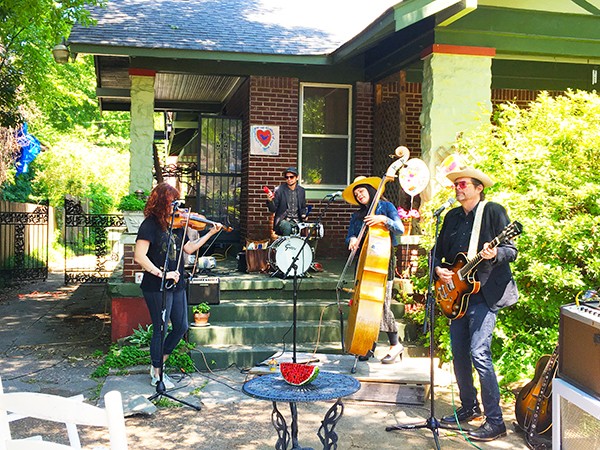
Amy LaVere and Will Sexton
There wouldn’t be a Flyer Music Issue without music. And, without question, the music and musicians are still there, working their craft, helping all of us cope — and with a new sense of connection and hope.
Players and Payers, Now Online!
We all know about live-streamed shows by now, of course. It’s become the new normal, and with our weekly online listings in The Flow, the Flyer has attempted to acknowledge and promote the practice. But it’s tricky to keep up with all the action. In the past week alone, we listed nearly three dozen separate streaming events, and we know we didn’t cover all of them. (Musicians, send us your announcements!) Several of these were virtual festivals with a dozen artists or more, all coordinating their homebound performances through a central hub. All told, these artists’ commitment to both social distancing and social unity (and, let’s face it, self-promotion) has been impressive. Thanks to the internet, perhaps we can have our cake and eat it too?
Nationally, live-streaming has had its ups and downs. The data-crunching company Chartmetric released a study earlier this month stating that: “The U.S. Top 100 YouTube artists surged during lockdown, but as daily infections continued to rise, that demand failed to keep pace, perhaps because consumers turned to other non-music content or other sources of entertainment as the reality of sheltering in place indefinitely started to set in.”
That leaves aside the question of why viewership should correlate in any way with the infection rate. Once you’re in place, either you’re prone to watch live music or you’re not. And of course, national data on “the top 100 artists” has almost nothing to do with the local scene, which celebrates independent artists in all their forms. By all indications, live-streamed music events are on the rise in Memphis. (The first edition of The Flow only listed two dozen events.)
And many are reaping some sorely needed financial rewards for their live-streamed efforts. Mark Edgar Stuart, who has done four such online events, was taken aback at the response. “The first two I did, I was like ‘Wow, I’ve never made that at a gig before!’ There might be something to this web show business, you know? This might carry on once COVID-19 is over.”
Most of Stuart’s events have taken the classic “man with guitar lives here” approach, where he plays for viewers from a chair in his home. But he’s been inspired by others who strive to lend their live events more panache. “I love seeing how people are getting creative with it. Graham Winchester, doing a show in the bathtub! I saw Jesse James Davis do one a few weeks ago. He had his backing beats happening and it looked cool. I was like, ‘Yeah, kudos.'”
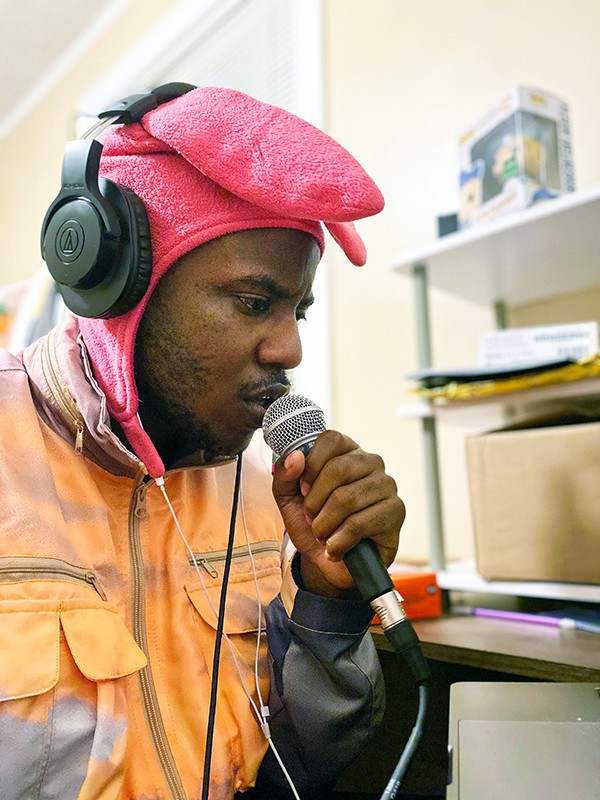
A Weirdo From Memphis aka AWFM
Striving for an original approach is on many performers’ minds. A Weirdo From Memphis, aka AWFM, says his plans for live events have been steadily evolving. “I decided to fall back until I can make it special. I don’t know if you’ve just logged on to Instagram on a random Friday night and seen like 12 Live bubbles across the screen? It used to be kinda like an exciting anomaly. ‘Whoa, somebody’s on Live, what are they gonna be doing?’ And now it’s like everybody has their own live TV show. Which is sometimes just them sitting there. People think that what they do is special, and they think that they’re standing out but don’t really zoom out and see the picture and see that you’re really just walking in the same direction as everybody. So I’d rather make sure, when I do pop on Live, it’s a thing to get excited about because I’m doing something different. I’ve really spent some time figuring out what that was supposed to be for me. And I have the answer now, and everything I need to do it is on its way to being in my hands. If you’re not really about the artistic experience, it’s like a microwave. I’m trying to put some food in the oven!”
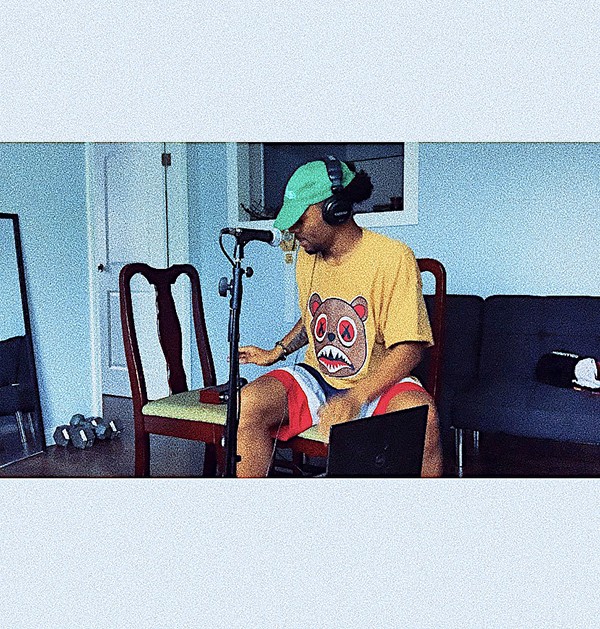
PreauXX
Fellow Unapologetic rapper PreauXX keeps his IG Live events fresh with the inherent spontaneity of freestyle, at which he excels. “Whenever I want to get some stuff out, I just go on IG Live for 30 to 40 minutes and just freestyle over beats. And whoever joins in my Live will give me a beat or give me a topic, and I just rap for 40 mintues, just for the hell of it.”
Of course, not everyone can rap extemporaneously with such aplomb, especially if your forte is making beats. But Unapologetic producer C Major has taken to the live internet anyway, via the beat battles hosted by a St. Louis-based group called Fresh Produce. As their web page (freshproducestl.com) explains, “Eight beatsmiths compete head to head in a tournament style bracket battle consisting of three rounds. Each producer is given at least one minute per round to impress the five judges, which include former winners from multiple beat battles, DJs, tastemakers from around the area, and the difference maker, The Crowd.”
As C Major points out, “It’s a whole experience, with interviews, clips of videos in between the beats. And the people in on the session can vote on whose beat they rock with the most. They’ve got a championship round on May 27th that I’m gonna be on again.”
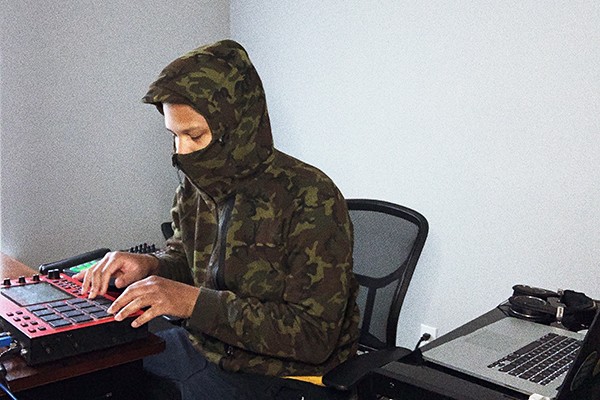
Producer C Major of Unapologetic
But C Major also points out another avenue for internet-based music, one he’s only now discovering: online gaming. “I’ve seen some crazy shit. They have whole festivals on Minecraft, which is ridiculous. There are bands, not even playing live, but with pre-recorded stuff they’re doing with their characters in Minecraft, and they’ve got a sea of people watching, just all characters on a computer. It’s crazy! You can be in the world of Minecraft and walk into a building and there will be a flyer and everything. And at a certain time, you go into a venue, and they’re just in there, the little blocks with guitars and shit. A drummer and shit. And your character is there with other characters. I’ve got two little boys, and they’re really into that world. So me and them stayed up one day and watched that. It’s crazy how creative people can be.
“Seeing that level of creativity just got me thinking,” he continues, “I can’t just hop on Live with my phone now. I mean, that’s cool, too. It has a level of personal-ness that you want, but at the same time, these people are out there, like they’ve been waiting for this moment.”
“My technology will shine now!” chimes in AWFM with a mad cackle.
Like so many of us (and like my own interview with them), the Unapologetic crew has also kept up their collaborative momentum with Zoom meetings, as they plan their next moves. “Every Wednesday, we have a big Zoom meeting with 12 to 15 people,” C Major explains. “It used to be a lot of planning and business, and we still do a lot of that. But now, I really cherish the time to just tell people what’s going on with me, and listen to what’s going on with them. It’s almost like therapy.”
PreauXX nods in agreement, adding, “Them kumbaya sessions are so soulfully needed.”
Another, more public version of stoking the creative fires has been pioneered by singer/songwriter Cory Branan, whose response to being a shut-in was to launch a homemade talk show, UMM, with his favorite fellow songsmiths. Episodes go live on Instagram every Wednesday, then remain archived on his YouTube channel. With such guests on the split-screen as Amanda Shires, Jason Isbell, Ben Nichols, and Frank Turner, it’s a veritable who’s who of today’s songwriting legends, and Branan’s queries reflect his own poetic approach to the craft: “You said when you finish a song, you’re like a sleepwalker who wakes up holding a bloody knife, surrounded by corpses,” he quips to Frank Turner, who responds, “I can still remember it being on the brain for a good few months, and then one day it’s finished …”
Other musicians are taking live-streamed shows to another level, albeit with careful social distancing in place. After all, many of us wish the drummer was always forced to stay six feet away. (ba-dum-bum!) Amy LaVere and Will Sexton, living together in matrimonial bliss, began their Thursday “Love Stream” shows on Facebook simply enough as a duo, but now have stepped out on their porch for some shows, inviting bandmates to play along from a safe distance.
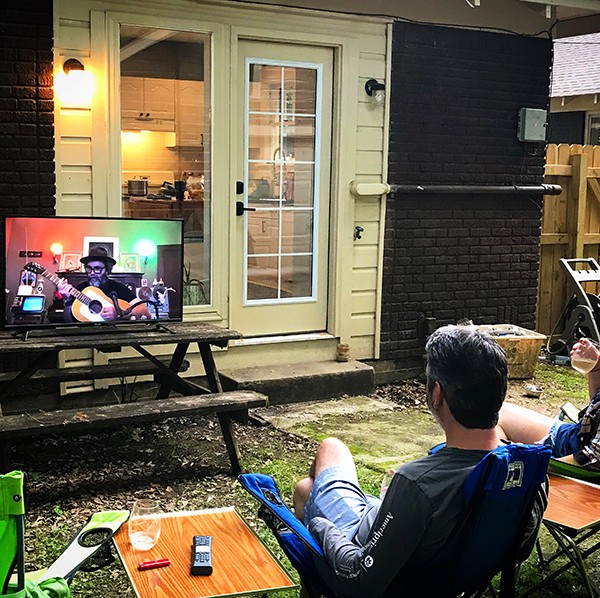
Mark Edgar Stuart — via virtual remote control
And now, almost as an outgrowth of this internet community, actual live music, in front of real people, is beginning to take form in unpredictable ways. When the Joe Restivo 4 held an impromptu concert on drummer Tom Lonardo’s porch last Wednesday, with social distancing in place, it attracted a small crowd, well-spaced, up and down the street.
But Mark Edgar Stuart may have the best, and strangest, example of this. As he explains, “Three weeks ago, I did a show for a bunch of pontoon boats. I had a superfan out in Eudora, Mississippi, who lives in a lake community, and he was like, ‘Dude, will you do a concert? I’m gonna promote it to the rest of the lake, and we’re gonna have all the pontoons come out to the dock and you can play.’ I was on a dock with a PA, nobody around me. And it was a listening crowd. You could smell the joints being passed around. It was fun! It was about 18 boats, maybe 50 or 60 people watching. They were all six feet apart.”
Venues Hunker Down
Such wacky alternatives do make players and fans alike a bit wistful about actual music venues. But, looking for signs of hope that we’ll one day have music in clubs again, I need turn no further than the sounds of hammers swinging down the street. As all the world shelters in place, B-Side Bar is giving its stage a makeover. “We had to raise it up a few inches to fit these new subwoofers under there,” says co-owner Brad Boswell. And they’re not the only ones making the most of the downtime.
“We’re just trying to get things that we never get done when we’re just blowing and going like we do,” says Jason Ralph of the Blues City Cafe. “When you’re as busy as we are all the time, you don’t have a chance to do a lot of the things that you want. So we’re trying to take advantage of this unfortunate break we’re having. Like redoing the kitchen floor, things like that.”
Owners and managers of music venues throughout the city are nervously pondering the day when people can congregate once more. Yet no one is sure what conditions need to be met for that to happen. Some plan to follow the authorities’ lead. “Everything will be based on CDC and what they put out, and what local government puts out,” says Ralph. “What I really don’t want is to make that happen and then have to close again.”
Yet some feel even an official go-ahead may not be enough. “We’re not gonna open up just because the governor says it’s okay, you know?” says Boswell. “We’re just gonna play it by ear. It’s possible we’ll start out doing live-stream shows first, before we fully open. But we’re not even discussing it yet at this point.”
Brett Batterson, president and CEO of the Orpheum Theatre Group, thinks smaller venues will have an advantage. “I think the smaller venues like Halloran Centre will open first. Gradually we’ll get to a point where the Orpheum will reopen.” Meanwhile, they’re hosting home-recorded performances in their Memphis Songwriters Series, regular live-streamed events on Facebook every Saturday.
Most see reopening as a mirror image of how they shut down. Boswell notes that B-Side was one of the first to shut down, and may be among the last to open again, perhaps starting with only live-streamed shows.
Blues City Cafe first phased out bands, then allowed dining customers at half-capacity for more distancing, then offered only takeout before closing completely. Ralph thinks featuring live bands will be the last phase of reopening, but even that will take some adjustment. “A lot of people don’t realize, it’s gonna look a lot different, regardless,” he says. “Even once we’re going 100 percent, as busy as we are on Beale Street, it’s not gonna be like it was any time soon.”
Laying Down Tracks
While we await such changes, musicians soldier on, and records — the other side of the musical coin — are continuing to be made, by hook or by crook. Since the quarantine era, there’s been a flowering of tracks swapped via the internet. While many producers and engineers have found the explosion of home recording gear to be a mixed blessing (pun intended), in times like these, such home rigs are keeping many of them busy. Since shelter-in-place began, countless players have gone back to finish tracks, often inviting colleagues to add overdubs in their own home studios, to then assemble later into a final mix.
As usual, the Unapologetic collective is ahead of the curve. Nothing as clunky as email is needed. As C Major explains, “We’ve actually got it set up to where the whole ProTools folder is on Dropbox, so whenever you record [in your home studio], I’m getting the updated session immediately. And I’ll go in and tweak stuff. So we’re basically kind of in the same studio, just over the internet. We just adapted that way. Dropbox updates in real time. So if anyone makes any change to the session, it’s gonna show up on mine.”
Others take a hybrid approach, stepping carefully into the city’s professional studios, armed with masks and sterilizer. Calling me from Delta-Sonic Sound, the studio run by Big Legal Mess producer Bruce Watson, Mark Edgar Stuart gives an on-the-scene report. “Will is in the tracking room, wearing a mask. I’ve been wearing a mask all day and am now outside. Bruce has been wiping down the headphones and all that kinda business.”
A similar scene, with even more players, was in place at the famed Royal Studios two weeks ago, when Michael Graber invited his favorite players to record new material — composed during his days and nights as a shut-in — with Boo Mitchell at the helm. “A lot of musicians who are usually busy with gigs or on the road were able to join in on the sessions,” he explains. “So we planned to go in and properly distance and record. And we ended up, in two days, recording 24 original songs. Some of these songs are strange compositions. We’d use traditional bluegrass instrumentation on some, but then we were throwing in dulcimers, harmoniums, bouzoukis, six-part harmonies, that kind of stuff. So it got pretty wild.”
Though everyone wore masks, hosting so many players at once proved challenging, and Graber sounds a cautionary note: “It was really, really hard to sing. I ended up taking my mask off. As did some of the other background singers. We tried to keep distanced. We were very conscious the whole first 12-hour day. But by the end of the second day, we were getting tired, people were rushing to the food when we had it out. The longer we went, the more the challenge it was to hold up those standards. It’s just what it is. It was a microcosm of what’s gonna happen as we re-enter society. First we’re very cognizant, and then we slowly let our guard down.”
AWFM says, “When we create, it’s really on top of each other, kinda like a family vibe, but that’s not the wisest thing to do right now. Especially with everybody going back home to their families. ‘Cause you can be like, ‘I’m good,’ but not realize that you’re a carrier of it and take it to somebody who’s less equipped to deal with it. That would be pretty devastating. I’ve seen people that have accidentally killed their parents or grandparents, just by having a mild case of it. They had already been existing in the house for two weeks, and really messed things up. So we haven’t created face-to-face in a minute. It’s a lot to lose, man.”
Musicians and non-musicians alike struggle with such contradictory impulses these days: to be safe, to protect others, but at the same time, to create, to collaborate, to commune. Perhaps the Unapologetic approach can benefit all of us. Says PreauXX, “For all of us, it’s been a survivor’s mentality. You can either lounge around or you can adapt.”
NIVA
More than two months ago, Growlers hosted metal bands Weedeater and The Goddamn Gallows during what would become the venue’s final show before it was forced to temporarily shut its doors due to stay-at-home orders caused by COVID-19.
Within that period, Growlers has seen a loss of tens of thousands of dollars, and with a definite reopening date unknown at this time, that loss could add up to be much more. Growlers has since begun offering takeout food and has applied for and received loans from the Small Business Administration (SBA). But according to Mike Glenn, managing partner and national talent buyer for the venue, that’s not going to be enough to keep them afloat until they can reopen.
“We have a great landlord in Yong Rhee, so he’s been helping in regards to rent,” he says. “But there’s utilities, certain taxes, etc. We are accruing a debt load, as are all venues.”
Nearly a month ago, Glenn caught wind of independent venues throughout the country joining a group called the National Independent Venue Association (NIVA) who have been seeking to rally support from state representatives and from U.S. congressional leaders to provide additional federal aid for venues.
“Dayna Frank, [owner of First Avenue in Minneapolis and president of NIVA], is a friend of mine, and I heard rumblings of her and a few other indies starting this,” says Glenn. “So, being in this business my entire life, this was something important to me. We don’t have billions like Live Nation or AEG. So I’m very passionate about standing for indie venues and promoters.”
NIVA, which comprises more than 1,600 independent venues throughout the country like Minglewood Hall, Exit/In in Nashville, and the Troubadour in Los Angeles, has issued a letter to the U.S. Congress asking legislators for further assistance to help keep overhead charges and taxes paid until they can present shows again.
In the letter addressed to Speaker of the House Nancy Pelosi, Senate Majority Leader Mitch McConnell, Senate Democratic Leader Chuck Schumer, and House Minority Leader Kevin McCarthy, the collective asked that the SBA’s Paycheck Protection Program be revised to increase the program’s loan cap and extend the program until all the affected businesses can resume operations at full capacity. They also asked for other modes of assistance, including establishing a business recovery grant fund, granting various forms of tax relief, and extending unemployment insurance to contract workers and artists who wouldn’t normally receive benefits.
Glenn has worked closely with Chris Cobb, owner of Exit/In, contacting Tennessee Representatives Steve Cohen and Jim Cooper, as well as Senators Lamar Alexander and Marsha Blackburn, to ask for their support.
“The conversations with them have been very promising,” says Glenn. “All have supported the efforts.”
Last week, there was progress on the local level when the Shelby County Commission approved an amendment to the 2021 fiscal year budget that would allot $100,000 to assist local venues like Growlers, Minglewood Hall, and Levitt Shell with rental and employee assistance.
“I’ve only heard of a few other cities in the country doing that,” says Glenn. “So it’s wonderful having great local leadership who support the arts.”
According to Glenn, this is a good starting resource for venues in Memphis to be able to stay on their feet until they are able to put on shows again.
“We just want to get back to what we love, putting on events for people to have a great time,” he says. “But we also want to be safe about it. There’s just something about a room full of people vibing together that can’t be replicated with other options. So, hopefully, we’ll get back to that sooner than later. The people are the reason I’m in the business in the first place.” — Julia Baker
So we’re venting, huh? Let’s start with a quote.
“Memphis has always been willfully ignorant of the transcendent artists walking its streets, willfully negligent of the African-American culture that produced them.” — Robert Gordon
The “Party Like a Redneck” mug pictured on this page was the first thing I saw when I walked into the Beale Street Landing visitors center a couple of years ago. I was with my good friend Victoria, and we were checking out the location with hopes of possibly doing a large event in the area.
I saw it, laughed, walked away, and had to come back and take a picture of it. I couldn’t believe that this was the first object people saw as they walked into the visitors center.
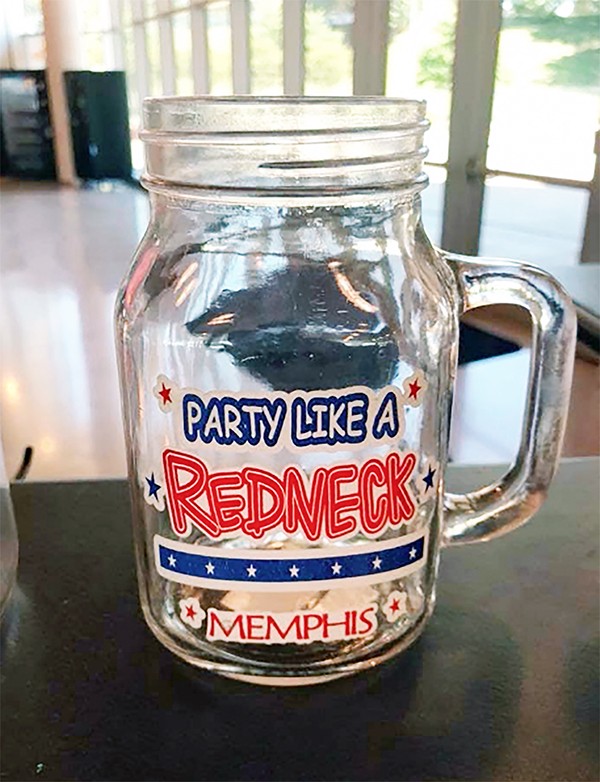 IMAKEMADBEATS
IMAKEMADBEATS
Memphis — the home of the redneck?
I then looked around the room, to see what else was there — specifically looking to see what kind of representation black people had in this room. … You know, the visitors center for a city that’s almost 70 percent black and historically has been made internationally famous thanks to the artistic creations and contributions of black people.
What did I see in that visitors center? A whole bunch of Elvis. There was an image of B.B. King behind the counter, and a few other items were on display with the images of blues/soul singers from the ’60s/’70s — black entertainers holding guitars, saxophones, etc. But what I was really looking for was the proportional representation to how black this city is. Was there something relating to black culture similar to whatever “party like a redneck” is to white culture?
Then I thought to myself, “You’ve spent 30-plus years in Memphis. Have you ever run up on a ‘redneck’ party?”
Nah. Memphis is so black, where would something like that happen in this city? Maybe slightly on the outskirts, or in Mississippi, for sure. But in the heart of Memphis, where are these “redneck” parties happening? And if they are happening, are they happening so much that a reference to them is literally the first thing you see — available for purchase to remember Memphis by in the visitors center?
Then I had to consider that maybe these “redneck” parties do happen, and I’m just too black to be invited? Maybe. Maybe not.
I looked up “redneck.” I wanted to be sure. Here’s what I found: Redneck, an uneducated white farm laborer, especially from the South. A working-class white person, especially a politically reactionary one from a rural area. “Rednecks in the high, cheap seats stomped their feet and hooted.”
I had no idea this city was deep enough in the people those definitions refer to to make a reference to them the first thing you see at the Beale Street Landing visitors center. This cup (variable A) and it being in this visitors center (variable B), where it was in the center (variable X), and the proportion of the representation of African Americans in that room (variable Y). … It’s what I see over and over again in this city. In this story, it’s a cup and a visitors center. In other stories, it may be who gets chosen to do a show at the Levitt Shell; just replace the variables.
People’s favorite word to throw around now is “equity.” It’s the world’s new and trendy way to “confront the issues.”
This city has an identity issue. A big one. I’ve never been in a city with a bigger identity issue. It’s an issue that finds its arguments not just in race, but also in generations. Meanwhile, other cities and communities value the parts of their identity that either get suppressed or ignored here and have built whole economies off of them. And we wonder why this city has a problem retaining its talent — keeping young and brilliant people here to help build it.
I tell people all the time: Your home ain’t gotta be pretty for you to want to stay and make it better, but first, you gotta believe it’s your home. It has to feel like your ideas are supported and you and your people are accurately represented and have a chance of success.
Seeing “Party Like a Redneck” mugs in the visitors center doesn’t sound like a city ready to embrace its culture of mostly black people doing black things. It sounds like a city that doesn’t want you to know it’s full of black people doing black things that aren’t the blues. We love the blues, but we’ve done a lot since the days of the blues.
There was a guy who’d asked us to check out that location. When he checked back in to see what we thought of the place, he said he’d heard all about that cup and wanted to apologize for it. I respected that, but it shouldn’t take me pointing this out. How tiresome it is to be the guy who’s gotta point this shit out. Over and over. It’s exhausting AF.
PS: I didn’t get to discuss how the word “redneck” is offensive in itself. All definitions consider it “derogatory.” That’s worth its own conversation, for sure. I just wanted to point out that you walk into black-ass Memphis and there’s a cup that says “party like working white people from rural areas. Welcome to Memphis” as soon as you walk in.
IMAKEMADBEATS is a producer, engineer, and founder of Unapologetic.
Tennessee has come in for criticism for its responses to the coronavirus pandemic, but at least one organization, having surveyed 50 states, rates the Volunteer State as not having done all that shabby. The personal finance website WalletHub ranks Tennessee fourth-best overall in how well its health infrastructure was prepared going into the pandemic.
In specific areas, WalletHub rates Tennessee as follows:
• 20th – Public Healthcare Spending per Capita
• 14th – Number of Hospital Beds per Capita
• 30th – Epidemiology Workforce per Capita
• 11th – Emergency Centers and Services per Capita
• 2nd – Intensive Care Unit (ICU) Beds per Capita
That’s the (relatively) good news. A pair of ongoing lawsuits, each of which was scheduled for a key moment in court this week, suggests that other issues are not nearly so salutary.
A preliminary hearing was set for this Wednesday in the courtroom of federal District Judge Sheryl Lipman on a new suit filed against the office of the Shelby County sheriff, seeking emergency action on behalf of inmates currently infected or under threat of “severe injury or death” as a result of the COVID-19 outbreak.
Filed last week jointly by the American Civil Liberties Union of Tennessee; the American Civil Liberties Union; Just City; Paul, Weiss, Rifkind; Wharton & Garrison LLP; and attorneys Brice Timmons and Steve Mulroy, the suit is a federal class action that seeks the release of those prisoners deemed non-dangerous.
The suit “asks for identification of medically vulnerable individuals held at the jail and the immediate release of vulnerable people, most immediately those who are detained solely on the basis of their inability to satisfy a financial condition of pretrial release, or solely on the basis of a technical violation of probation or parole unless the county demonstrates that an individual poses a flight or safety risk.”
The suit alleges that, “as of April 30, 192 people at the jail had tested positive for COVID-19, and one jail employee had died.” It further notes that “[s]tatewide, the greatest number of deaths from the virus have occurred in Shelby County” and that, according to the latest reports, “86 percent of inmates at the Shelby County Jail were there pretrial.”
Alleging that the sheriff’s office is violating the 14th Amendment to the United States Constitution as well as the Americans with Disabilities Act and the Rehabilitation Act, the suit cautions that “an outbreak at the jail would spread widely in the community, draining the Memphis area of limited resources to fight the pandemic.”
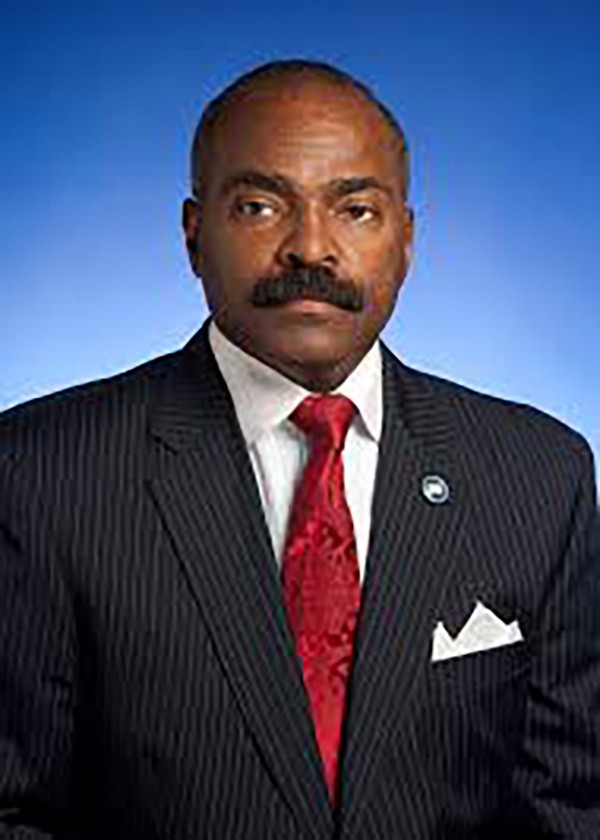
G.A. Hardaway
See Viewpoint at memphisflyer.com by State Representative G.A. Hardaway (D-Memphis), chair of the Tennessee Caucus of Black Legislators, for more perspective on the jail as a “petri dish” for the COVID virus.
• The coronavirus outbreak is the main reason also for another suit, due for a hearing Thursday in the court of Chancellor Ellen Lyle in Nashville. This one, filed recently by Memphis lawyers Steve Mulroy and Jake Brown for the ad hoc group Up the Vote 901, cites the pandemic as a reason to extend the right of absentee voting to all registered Tennessee voters — a request so far denied by state officials. A parallel suit filed by the American Civil Liberties Union of Tennessee may, at Judge Lyle’s discretion, be folded into the original suit, and yet a third suit to the same end has been filed by the NAACP in another jurisdiction.
In a brief presented to the Court, State Attorney General Herb Slatery made several arguments against the proposed action, citing “numerous barriers” to rapid implementation of statewide absentee voting, including alleged costs of millions of dollars and “opportunities for error” indicated in the experiences of other states.
Tennessee is not the only arena where the right to vote by mail is at stake. After Michigan and Nevada sent applications for absentee voting to all registered voters, President Trump threatened those states with the loss of federal funding. The president claims the process of widespread voting by mail invites open fraud, though he himself recently voted absentee in Florida, and Republican states like Ohio have conducted elections by mail without incident. In any case, evidence of such fraud through absentee voting has proved hard to come by.
In the face of the pandemic, 11 of the 16 states that limit who can vote by absentee ballot have eased their election rules this year to permit expanded absentee voting in upcoming elections.
It’s Gonna Happen
 Posted to Reddit by u/magnificentmemer
Posted to Reddit by u/magnificentmemer
Morgan & Morgan
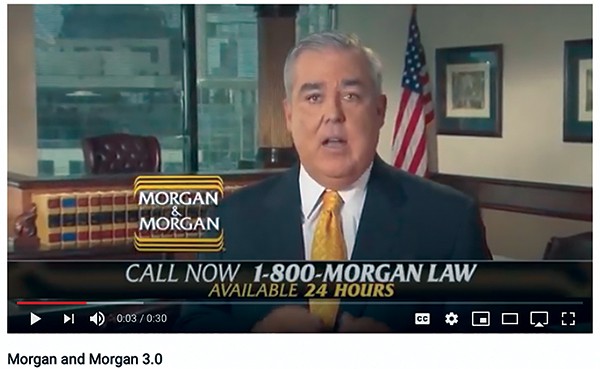
Posted to YouTube by user Downhill way back in 2016, the Morgan & Morgan video rises spectacularly from the ether when you least expect it (and maybe need it most).
Here’s a sample since you can’t play it on paper: “Morgan & Morgan Morgan & Morgan Morgan & Morgan Morgan & Morgan Morgan & Morgan Morgan & Morgan Morgan & Morgan …” Look up this classic today.
Posted to Reddit by u/SmartPreference
Yes.
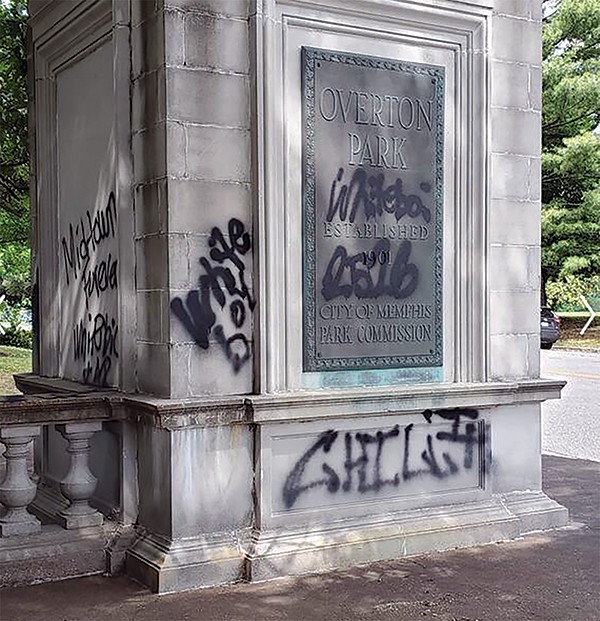 Posted to Nextdoor by Jason Horn
Posted to Nextdoor by Jason Horn
Jason Horn said on Nextdoor last week, “Makes me sad to see vandalism and tagging at Overton Park.”